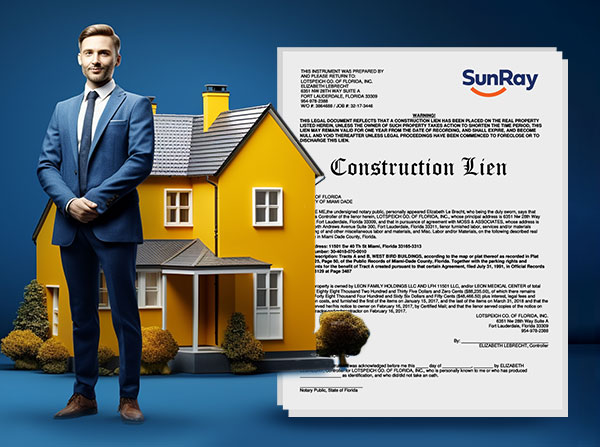What are the Lien & Notice Deadlines in Florida? - A Comprehensive Guide
This guide explains the crucial deadlines in the Construction Lien process, from serving initial notices to filing lawsuits in Florida, ensuring contractors protect their rights and secure timely payment.
Last updated:
Feb
20
,
2025
Published:
Jul 07, 2023
3 Mins
Read
When working on construction projects, it's crucial for contractors and suppliers to be aware of the various deadlines associated with protecting their rights and ensuring timely payment. Failing to meet these deadlines can result in significant financial loss.
In this blog post, we will walk you through the essential time frames involved in the Construction Lien process, from serving initial notices to filing lawsuits in Florida. So, let's dive in and explore the key deadlines in chronological order.
When should you send an NTO?
Send an NTO within 45 days of your First Work - When you start working on a construction project, it's vital to protect your rights by serving a Notice to Owner/Notice to Contractor (NTO) within 45 days. Remember, sooner is always better. The NTO serves as a formal notification to the owner or contractor that you are a party involved in the project.

When should you Record a Lien or serve a Notice of Nonpayment?
Record a Lien or serve a Notice of Nonpayment within 90 days of your Last Work - Within 90 days of completing your work on the project, you must either record a Lien or serve a Notice of Nonpayment. This deadline is crucial, as it marks the last possible day to take action. Recording a Lien entails formally documenting your claim against the property, while the Notice of Nonpayment informs the owner and contractor of your outstanding payment issues.
When should you serve the Lien to all interested parties?
Serve the Lien on all interested parties within 15 days - After recording the Lien, you have 15 days to serve a copy of it to all interested parties involved in the project. When using services like SunRay, these mailings are handled automatically. However, if you decide to handle it yourself, ensure that you not only record the Lien but also send a copy to everyone listed in the Notice of Commencement.
When should you serve a Contractor's Final Affidavit?
Serve Contractor's Final Affidavit at least 5 days before a lawsuit - If you have a direct contract with the owner and hold a construction Lien, it's essential to prepare, notarize, and send a Contractor's Final Affidavit to the owner at least 5 days before filing a lawsuit to foreclose on the Lien. This affidavit provides additional information regarding your claim.
When should you file a lawsuit to foreclose on the Lien?
File a lawsuit to foreclose on the Lien within 1 year from recording date - To protect your Lien rights, you must file a lawsuit to foreclose on the construction Lien within one year from the recording date of the Claim of Lien. This legal action ensures that you can pursue your claim through the judicial system.
When should you file a lawsuit on the Bond Claim?
File a lawsuit on the Bond Claim within 1 year from the date of last work - If you have a claim on a payment bond, the deadline for filing a lawsuit against the surety is within one year from your last day of work on the project. Note that the bond claim deadline differs from the Lien foreclosure deadline.
Can Notice and Lien Deadlines be modified?
Deadlines in the construction Lien process can be shortened under certain circumstances.
- The owner, contractor, or surety may have the authority to reduce the time for initiating legal action.
- In some cases, these deadlines can be as short as 60 days or even 20 days.
- Staying informed about any modifications that could impact your rights is essential.
A Recap - Notice and Lien Deadlines to remember in Florida

Here are the key construction Lien deadlines to remember in Florida:
- Notice to Owner/Notice to Contractor (NTO) - 45 days of your first work.
- Recording a Lien or Serving Notice of Nonpayment - Within 90 days of your last work.
- Service of Lien: - Within 15 days of recording the Lien.
- Contractor's Final Affidavit - At least 5 days before filing a lawsuit to foreclose on the Lien (if in direct contract with the owner).
- Lawsuit to Foreclose on Lien - Within 1 year from the recording date of the Claim of Lien.
- Lawsuit on Bond Claim - Within 1 year from your last day of work on the project.
By adhering to these deadlines, contractors and suppliers can protect their interests and navigate the construction Lien process successfully in Florida.
Conclusion
Navigating the Construction Lien process requires a thorough understanding of the various deadlines involved. By adhering to these time frames, you can protect your rights, ensure timely payment, and take appropriate legal action when necessary. Remember, serving initial notices, recording Liens, and filing lawsuits within the specified deadlines are critical steps to secure your financial interests in the construction industry. Stay proactive, stay informed, and safeguard your rights throughout the project lifecycle.
Sunray Construction Solutions offers professional "Notice to Owner Florida" services to help you secure your lien rights in the construction industry. Looking for a free Notice to Owner form in Florida? Get your free, editable "Florida Notice to Owner Template" today for easy and accurate preparation.
At Sunray Construction Solutions, we also understand the importance of protecting your rights on a construction project. Learn how to use the Florida mechanics lien form and how to file a mechanics lien in Florida to ensure you're paid for your hard work.














